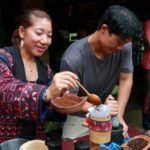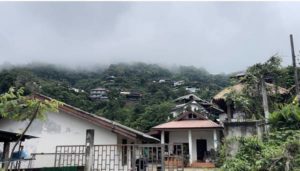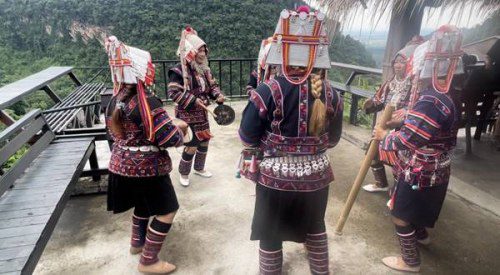 Foreigners and the newer generations often wonder about the deep affection and loyalty Thai people demonstrate towards their monarchy. One such tale of devotion starts in Doi Pha Mee, a locale situated in the Mae Sai District, Chiang Rai Province. Stories abound about the visits of King Bhumibol Adulyadej, marking the initial stages of an inspiring journey during his reign. He visited Doi Pha Mee three times in 1970, 1971, and 1974. Along with the Queen, His Majesty also visited Doi Tung.
Foreigners and the newer generations often wonder about the deep affection and loyalty Thai people demonstrate towards their monarchy. One such tale of devotion starts in Doi Pha Mee, a locale situated in the Mae Sai District, Chiang Rai Province. Stories abound about the visits of King Bhumibol Adulyadej, marking the initial stages of an inspiring journey during his reign. He visited Doi Pha Mee three times in 1970, 1971, and 1974. Along with the Queen, His Majesty also visited Doi Tung.
During these visits, they engaged with the hill tribe and initiated transformational changes. These led to the metamorphosis of the area, once a deforested mountain notorious for opium-poppy cultivation on the Myanmar border, into a lush green forest and a popular natural tourist attraction.
Doi Tung and Khun Naang Nong Mountain became the first areas in Thailand to cultivate Arabica coffee, thereby creating jobs and substituting opium farming and shifting cultivation with forest plantations. This change, especially during the rainy season, lured tourists in large numbers, eager to witness the breathtaking beauty of Khun Naang Non.
Doi Pha Mee primarily hosts the Akha hill tribe, who have their unique language and culture. Many legendary tales circulate among the elders and younger generations about the traditions and burgeoning tourism in Doi Pha Mee. The region has evolved to include homestays and coffee shops, all of which are designed with photographic spots, viewpoints, and places to enjoy tea and coffee.

Phamee village surrounded by a green mountain and tourist attraction after the royal project contract farming to plant the coffee and conserve the forest.
Workshops on community wisdom, coffee processing innovations, and the creation of bamboo coffee drippers are available, a testament to the Akha people’s ingenuity in replacing unsustainable online purchases and coffee grinding machines.
In addition to being the first coffee plantation area, Doi Pha Mee is renowned for its superior coffee quality, thanks to the limestone terrain and high mineral content that produce a mellow flavor. The area also grows macadamia nuts, an initiative of the royal family who provided seedlings for cultivation. This initiative has significantly improved the locals’ livelihoods and increased their economic stability, as their produce supports royal projects.
This story encapsulates the enduring bond that began with King Bhumibol Adulyadej’s sustainable vision. His first journey into this remote area, once secluded from development, has since bettered the hill tribe people’s lives. They, along with their families, remain deeply grateful for the royal benevolence, forming a strong bond that intertwines the monarchy and the hill tribe people.
Written By: Prakaidown Baengsuntia



















